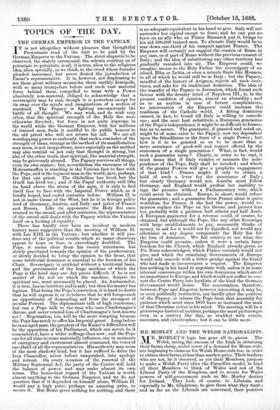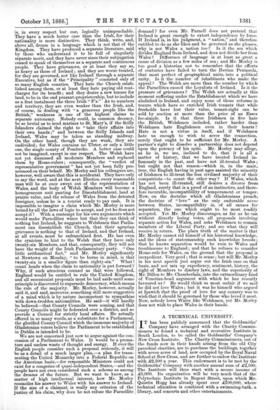MR MORLEY AND THE WELSH NATIONALISTS.
MR. MORLEY'S logic has gone all to pieces. The Welsh, seeing the success of the Irish in obtaining their farms cheap, under cover of a demand for Home-rule, are beginning to clamour for Welsh Home-rule too, in order to obtain their farms at less than market-price. Their leaders, who are not, be it observed, as yet their Members, propose to make a Welsh Party after the Parnellite model, to bind all their Members to think of Wales and not of the Liberal Party of the Kingdom, and to secure for Wales powers of self-government such as Mr. Morley desires for Ireland. They look, of course, to Liberals, and especially to Mr. Gladstone, to give them what they want ; and as far as the Liberals are concerned, their position is, in every respect but one, logically unimpeachable. They have a much better case than the Irish, for their nationality is more distinctive. They think, write, and, above all, dream in a language which is not that of the Kingdom. They have produced a separate literature, said by those who understand it to be full of singularly separate merit, and they have never since their subjugation ceased to speak of themselves as a separate and continuous people. They have grievances, or at least they say so, as heavy as those of Ireland; and they are worse treated, for they are governed, not like Ireland through a separate Executive, but as if the " Principality " consisted only of so many English counties. They hate the Church estab- lished among them, or at least they hate paying old rent- charges for its benefit ; and they desire a new tenure for land, to be in the end peasant-proprietorship, but to include as a first instalment the three Irish "F's." As to numbers and territory, they are even weaker than the Irish, and, of course, in dealing with "a generous people like the British," weakness is one of the highest claims to separate autonomy. Nobody could, in common decency, be so brutal as to send marines to St. Mary's, if the Scilly Islanders claimed the right to "take their affairs into their own hands ;" and between the Scilly Islands and Ireland, Wales may be taken as standing midway. On the other hand, though they are weak, they are undivided; for Wales contains no Ulster, or only a little one, the single county of Pembroke. A better case could not be imagined, except in one respect. The Welsh have not yet dismissed all moderate Members and replaced them by Home-rulers ; consequently, the "verdict of representative government" has not yet been fully pro- nounced on their behalf. Mr. Morley and his colleagues are, however, well aware that this is accidental. They have only to say the word, and at the next Election every reasonable man will be at once swept out of the representation of Wales, and the body of Welsh Members will become a homogeneous unit panting for Disestablishment, land at prairie value, and the release of Wales from the detested foreigner, unless he is a tourist ready to pay cash. It is impossible to imagine a claim which Mr. Morley is more bound by all the laws of logic to accept, and yet he does not accept it ! With a contempt for his own arguments which would make Parnellites wince but that they can think of nothing but Ireland, he suggests to Welshmen that Parlia- ment can disestablish the Church, that their agrarian grievance is nothing to that of Ireland, and that Ireland, at all events, must be enfranchised first. He has even the cynicism to hint to the Welsh that they have only twenty-six Members, and that, consequently, they will not have the weight of the Irish Parliamentary party. "One little arithmetical fact," said Mr. Morley significantly at Newtown on Monday, "to be borne in mind, is that twenty-six is a smaller figure than eighty-six." What ! count heads when the claim to nationality is put forward ? Why, if such atrocious counsel as that were followed, England would be entitled to rule the United Kingdom, and all secessionist proposals must be laid aside until some principle is discovered to supersede democracy, which means the rule of the majority. Mr. Morley, however, actually said it, and said, moreover, something still more suggestive of a mind which is by nature incompetent to sympathise with down-trodden nationalities. He said—it will hardly be believed—that County Councils were coming, and that County Councils might be federated over a district, and so provide a Council for strictly local affairs. He actually offered in so many words, as a substitute for a Parliament, the glorified County Council which the immense majority of Gladstonian voters believe the Parliament to be established in Dublin is intended to be.
We are not concerned just now to argue against the con- cession of a Parliament to Wales. It would be a prema- ture and useless waste of thought and energy. If ever the English people consider such a proposal seriously, it will be as a detail of a much larger plan,—a plan for trans- muting the United. Monarchy into a Federal Republic on the American basis,—for responsible Ministers could not exist for a congeries of quasi-independent States,—and the people have not even considered such a scheme as among the dreams of the future. But we want to know, as a matter of high intellectual interest, how Mr. Morley reconciles his answer to Wales with his answer to Ireland.
If the size of a claimant is really any criterion of the justice of his claim, why does he not refuse the Pamellite demand ? for even Mr. Parnell does not pretend that Ireland is great enough to extort independence by force. If Ireland is, in his judgment, a "nation," and therefore entitled to do as she likes and be governed as she pleases, why is not Wales a nation too ? Is it the sea which divides England from Ireland, and does not divide her from Wales ? Difference of language is at least as great a cause of division as a few miles of sea ; and Mr. Morley is too good a historian not to remember that the efforts of centuries have failed to turn the Iberian Peninsula, that most perfect of geographical units, into a political unity. Is it the number of inhabitants who make the appeal ? The Welsh are more than the number by which the Parnellites exceed the Loyalists of Ireland. Is it the pressure of grievances ? The Welsh are actually at this moment suffering under the Establishment which we have abolished in Ireland, and enjoy none of those reforms in tenure which have so enriched Irish tenants that while freeholds have lost their value, tenant-right can be sold by auction at more than the price of an Essex fee-simple. Is it that three Irishmen in five hate the British, Welshmen included, rather harder than Welshmen hate Englishmen even in their hearts ? Hate is not a virtue in itself, and if Welshmen hate us enough to wish to sever the connection, surely that ought to be sufficient for Mr. Morley. A partner's right to dissolve a partnership does not depend upon the potency of his spite. Mr. Morley may allege, as he is, we see, inclined to do, that it is all a matter of history, that we have treated Ireland in- famously in the past, and have not ill-treated Wales ; but ought not that reason—which is, in the main, true, the English having in past ages assisted the minority of Irishmen to ill-treat the less civilised majority of their compatriots—to count the other way ? If Wales, which has not been ill-treated, still desires a divorce from England, surely that is a proof of an instinctive, and there- fore incurable, incompatibility of temperament or temper. Now, on the doctrine which all Gladstonians preach, the doctrine of " love " as the only endurable nexus between States, incompatibility is, of all causes for separation, the one which ought to be most readily accepted. Yet Mr. Morley discourages, as far as he can without directly losing votes, all proposals involving separate action for Wales, and asks Welshmen to remain members of the Liberal Party, and see what they will receive in return. The plain truth of the matter is that Mr. Morley cannot rid himself of his historical knowledge, and the ideas of statesmanship such knowledge breeds ; that he knows separation would be ruin to Wales and troublesome to England ; and that he refuses to consider Home-rule for Wales, on the ground that the proposal is inexpedient. Very good ; that is sense ; but will Mr. Morley in his next speech just argue out the Irish case on that basis, and not mix up expediency, sentiment, history, the right of Members to disobey laws, and the superiority of Mr. Dillon to Mr. Chamberlain, into the extraordinary kind of Venetian-bead argument with which he has recently favoured us ? He would think us most unfair if we said he did not love Wales ; but it was he himself who argued at Ipswich that the proof of love for any country was to wish that it should be governed by those who loved it most. Now, nobody loves Wales like Welshmen, yet Mr. Morley does not wish to place Wales in their hands.



















































 Previous page
Previous page